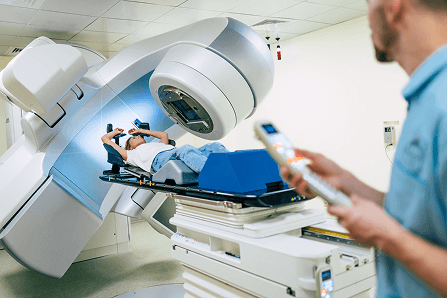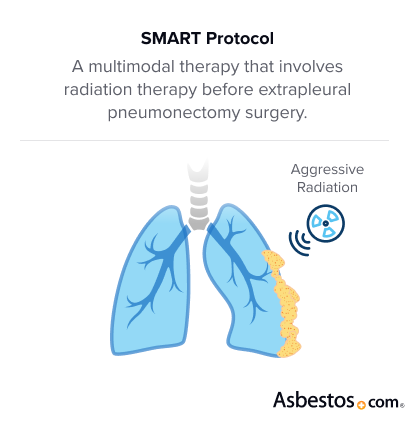
Mesothelioma SMART Treatment
SMART treatment for mesothelioma combines surgery and radiation therapy. It begins with radiation therapy on the chest and follows with surgery to remove tumors. Some people with pleural mesothelioma live longer than 5 years after SMART therapy.

What Is SMART Treatment for Mesothelioma?
SMART, which stands for surgery for mesothelioma after radiation therapy, is an experimental mesothelioma treatment. Doctors apply radiation first and then perform surgery. This order differs from the way doctors have historically treated mesothelioma. The goal is to improve the outcome of surgery, improve survival and reduce the risk of recurrence.
Key Facts About Surgery for Mesothelioma After Radiation Therapy
- SMART combines radiation and surgery. Doctors use radiation first with the goal of improving surgical outcomes.
- SMART aims to shrink mesothelioma tumors with radiation first. Surgeons then remove what is left with surgery.
- Doctors try to remove as much cancer tissue as possible to improve survival and limit recurrence risk.
- The treatment may help people with pleural mesothelioma live longer.
SMART is not a one-size-fits-all mesothelioma treatment. It requires a team of specialists who have expertise in mesothelioma. These specialists include thoracic surgeons, radiation oncologists and medical oncologists.
How Does SMART Work to Treat Mesothelioma?

Doctors use SMART to attack mesothelioma in 2 steps. First, they give radiation therapy for mesothelioma. The radiation can shrink mesothelioma tumors. This has the potential to make surgery easier.
Then, doctors perform surgery for mesothelioma. They remove as much visible tumor tissue as possible. This 2-step process aims to eliminate more cancer cells than surgery alone.
This approach is different from previous plans that combined surgery and radiation. Most often, doctors perform surgery first. Radiation has generally come after surgery in the past. SMART changes the order. This change may help people with pleural mesothelioma. Doctors continue to research SMART to see who benefits the most.
Benefits of SMART Treatment
SMART treatment may help certain people with mesothelioma live longer. It can also improve their quality of life. Doctors have seen positive results among certain patients. Mesothelioma patients with the epithelial cell type and without spreading to lymph nodes respond the best.
SMART Treatment Success and Survival Rates
- Patients with epithelial tumors that have not reached the lymph nodes had the best median survival at 65.9 months.
- The median survival was 42.8 months among patients with epithelial tumors that had spread to lymph nodes.
- Patients with biphasic tumors had a median survival of 18 months.
Dr. John Cho, a Toronto radiologist who led a phase II study on SMART for pleural mesothelioma, was impressed with the outcome among the best survival group. “That number is almost unbelievable. I thought for a minute it might be a mistake. It was the super group,” Cho said. “I had to go back and double-check everything. A very pleasant surprise. It showed, in some cases, you can do quite well with this disease.”
Doctors continue to evaluate SMART to learn more about its benefits. Research may find that SMART is safe for other types of mesothelioma.

Find the top cancer centers trusted by mesothelioma patients nationwide.
Get Help NowSide Effects of SMART Treatment
SMART treatment can cause side effects like fatigue and pain. Most side effects tend to develop after the surgical phase of the treatment. Doctors work to manage these side effects.
Commonly Reported SMART Side Effects
- Bleeding after surgery
- Chest tube complications
- Fatigue
- Infection
- Pain
- Respiratory issues
A phase 2 trial reported that grade 3 or 4 post-operative side effects occurred in 49% of the participants. Some people may develop breathing problems or pneumonia. Doctors watch for complications to prevent problems. Clinical trial participants often required a recovery period of 3 to 6 months for their quality of life to return.
Who Is Eligible for SMART Treatment?
SMART treatment isn’t for everyone with mesothelioma. Clinical trials have rules about who can join. They want to test SMART on people who meet certain health requirements. These requirements vary by trial.
While eligibility may differ among trials, research shows certain people respond better to SMART. Those with epithelial cell tumors and no cancer in their lymph nodes have shown the best survival rates.
Coexisting conditions can affect who can get SMART. If a person has other health problems, they may not qualify. Mesothelioma doctors look at each person’s health. They decide if SMART is right for them.
A clinical trial in Toronto is currently enrolling mesothelioma patients for the SMARTEST trial, which follows in the wake of the earlier SMART trial. This trial also explores using low-dose chemotherapy in addition to radiation. Cho is also leading that clinical trial at the Princess Margaret Cancer. Researchers expect to complete the clinical trial in 2028.
How to Receive Mesothelioma SMART Treatment
SMART treatment is available in clinical trials for mesothelioma. You may qualify to join a trial to get SMART. Studying SMART in these trials helps doctors learn more about the treatment.
What to Expect With SMART for Mesothelioma
- Radiation often happens a median of 5 days before surgery.
- You’ll stay in the hospital after surgery.
- Recovery takes time with this combined treatment.
- Doctors watch you closely for complications during and after treatment.
- Patient Advocates can help you find clinical trials.
Patients should seek out cancer centers with these types of mesothelioma specialists. “We do warn other centers from trying to do this sort of treatment if they don’t have the expertise or experience,” Cho tells us.
Patient Advocates can help you find mesothelioma clinical trials. You can also ask your mesothelioma doctors or mesothelioma treatment center. They can tell you about trials and help you find a trial that is right for you.
Common Questions About SMART
- How much does SMART cost?
-
The cost of SMART is unclear because the treatment is available in clinical trials. In clinical trials, the trial itself often covers the cost of the experimental portion of treatment.
- Does my insurance cover SMART?
-
If you qualify to join a SMART clinical trial, the trial often pays for the experimental part of the treatment. Your health insurance may cover the cost of any standard care you receive.
- Is SMART treatment available outside of clinical trials?
-
Right now, SMART is only available in clinical trials. As doctors learn more about the safety and value of the treatment, they may begin to offer it outside of trials.
- Does SMART treatment work for all types of mesothelioma?
-
Doctors use SMART mostly for pleural mesothelioma. They’re still investigating whether it may work for other types of mesothelioma.



